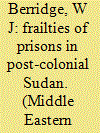| Srl | Item |
| 1 |
ID:
175419


|
|
|
|
|
| Summary/Abstract |
On 7 March 1985, the railway workers of Sudan’s north-eastern town of Atbara took to the streets to protest against the rise in the price of basic foods decreed by the regime of President Jafa’ar Nimeiri.1 These protests continued for two and a half weeks before the outbreak in Khartoum of the main Intifada, which toppled Nimeiri, his ruling party, and his main state security service. On 19 December 2018, similar protests against rising food prices erupted once again in Atbara, and spread to the rest of the country much more rapidly. As in 1985, these protests have shifted from their early focus on the cost of bread toward a resolutely political emphasis on the toppling of the President Umar al-Bashir and his ruling National Congress Party—hence the slogan ‘tasgut bas’, or ‘just go’. At time of writing, the uprising has lasted just over two months, far longer than those that unseated Sudan’s last two military regimes in 1964 and 1985, which needed just 5 and 11 days, respectively, to bring down the government. It is less Khartoum focused than the previous movements,2 as demonstrated by the prominence of the hashtag ‘cities of Sudan rise up (mudun al-Sudan tantafid)’. This not because the previous uprisings did not witness substantial regional revolt, for they certainly did,3 but because the rise of social media activism has enabled dissent to spread from regional cities such as Atbara to Khartoum and elsewhere much more speedily.
|
|
|
|
|
|
|
|
|
|
|
|
|
|
|
|
| 2 |
ID:
146786


|
|
|
|
|
| Summary/Abstract |
This article examines the slow eclipse of the rehabilitative ideal within the Sudanese prison system in the period from independence in 1956 till the removal of the third parliamentary regime in 1989. It contends that Jacfar Numayri's ‘Islamization’ of the criminal and penal system in 1983, which has been interpreted by some as an act of religious revival aiming to replace a series of externally imposed and European laws, cannot be understood purely in cultural terms. It will demonstrate that the Sudanese prison professionals of the post-colonial era pursued rehabilitative ideals with greater enthusiasm than their colonial predecessors. However, they were hampered by the limited resources offered to them by a government that became increasingly less interested in infrastructural social control and more concerned with exercising direct physical violence against both political and non-political transgessors of the state's law.
|
|
|
|
|
|
|
|
|
|
|
|
|
|
|
|